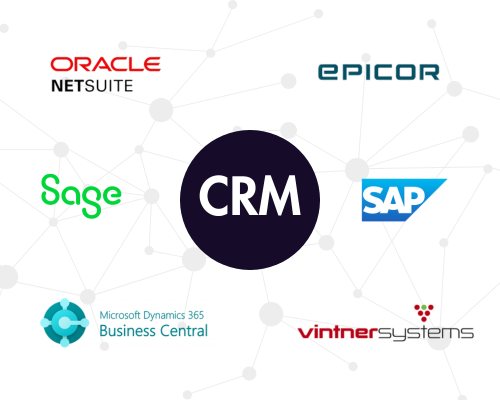How CRM software is used in manufacturing

Manufacturing companies have lots of moving parts. It can be difficult to manage every aspect of the supply chain and sales cycle without using a selection of different software tools to stay on top of things.
While all manufacturers are different, overall business goals remain the same:
- Produce high-quality products
- Increase sales
- Improve customer service
- Excel in time management
- Follow a safe and organised system
Your departments may use a variety of online platforms to work towards achieving these goals. But what if we told you that, with CRM (Customer Relationship Management) software, you can achieve all of these goals from within one system? In manufacturing, a CRM system is used to manage inventory, improve customer service, increase revenue and automate complex processes.
Whether you’re a large scale manufacturer working with a wholesaler, or a small business selling products independently through e-commerce sites, a custom CRM provides benefits for all types of company sizes. Keep reading to learn how a CRM is used in manufacturing and how it manages every aspect of the business.
1. Lead and customer management

One of the key functions of a manufacturing CRM is sales and lead management. It allows businesses to track leads, qualify prospects, and manage their sales pipeline efficiently. With forecasting tools, manufacturers can predict demand and optimise production schedules accordingly. The ability to generate accurate quotes and proposals ensures smooth order management, reducing errors and improving response times to customer enquiries.
Managing customer and account relationships is another vital aspect of a CRM in manufacturing. A centralised database stores all customer interactions, including emails, calls, and meetings, making it easier to track communication history. Companies can segment customers based on industry, order frequency, or location, helping sales teams tailor their approach and improve client retention.
2. Suppy chain management

Seamless supply chain integration ensures that materials are available when needed, reducing downtime and improving efficiency. CRM software allows businesses to manage supplier relationships, track shipments, and optimise procurement processes for better cost management.
By analysing customer data to predict demand, CRM software prevents overproduction or shortages while automating purchase orders and supplier tracking. CRM also streamlines order fulfilment by tracking orders from placement to delivery and improving communication across the supply chain. This enhances visibility, reduces inefficiencies, and ensures a responsive, customer-focused supply chain.
3. Inventory management

A CRM system helps manufacturers with inventory management by providing real-time insights into customer demand, sales trends, and order histories. By integrating CRM with inventory systems, manufacturers can better predict stock requirements, reducing the risk of overstocking or stock outs.
The system enables automated tracking of raw materials and finished goods, ensuring efficient replenishment and minimising waste. Additionally, CRM data helps align production schedules with customer needs, improving order fulfilment accuracy and reducing delays. With centralised information on supplier interactions and purchase histories, manufacturers can optimise procurement strategies and maintain a lean, cost-effective inventory.
4. Quality control and compliance

By integrating with ERP and production management software, CRMs help track quality metrics, manage supplier certifications, and enforce compliance with industry regulations such as ISO, FDA, or OSHA standards.
Automated workflows enable manufacturers to flag defective products, track non-conformance issues, and implement corrective actions promptly. Additionally, CRMs store audit trails, inspection reports, and compliance documentation, making it easier for businesses to demonstrate adherence to regulatory requirements and maintain high-quality production standards.
5. Machine and equipment maintenance

By automating maintenance reminders and flagging potential issues based on equipment usage patterns, a CRM helps prevent unexpected breakdowns and costly downtime. It also enables manufacturers to manage service contracts, warranties, and supplier interactions more efficiently, ensuring timely repairs and part replacements.
Additionally, CRM analytics provide insights into equipment performance trends, allowing manufacturers to optimise maintenance strategies and extend machinery lifespan. This proactive approach reduces operational disruptions, enhances productivity, and lowers overall maintenance costs.
6. Production planning and scheduling

A CRM system helps automate job scheduling, track work-in-progress, and optimise resource allocation, leading to improved efficiency and reduced downtime. Additionally, CRM analytics enable manufacturers to anticipate demand fluctuations, adjust production capacity accordingly, and streamline communication across departments. This results in a more agile and responsive production process, reducing waste and maximising profitability.
7. Real-time data and analytics

CRM software provides real-time analytics for manufacturers by collecting and analysing data from sales, production, inventory, and customer interactions in a centralised platform.
With live dashboards and automated reports, manufacturers gain instant insights into key performance metrics, such as order trends, production efficiency, equipment utilisation, and supply chain status. This real-time visibility allows for faster decision-making, helping manufacturers respond proactively to demand changes, production bottlenecks, or inventory shortages.
By leveraging real-time data, manufacturers can enhance operational agility, reduce costs, and improve overall business performance.
8. Integration with ERP and other systems

CRM integrations benefit manufacturers by connecting various business systems, such as Enterprise Resource Planning (ERP), inventory management, supply chain management, and production scheduling tools. By integrating CRM with ERP, manufacturers can streamline order processing, synchronise customer data with production workflows, and improve demand forecasting. Integration with inventory and supply chain systems ensures real-time stock updates, preventing shortages or overstocking.
These integrations enhance operational efficiency, improve data accuracy, and enable manufacturers to make informed, data-driven decisions that drive productivity and profitability.
With the power of CRM customisation, you’re able to create a system that is exclusively tailor-made to your business operations, no matter how complicated they are. Organise every aspect of your CRM to help you achieve your business goals.
Customising a CRM with no expertise can be a challenge. Contact us for help setting up your system.



